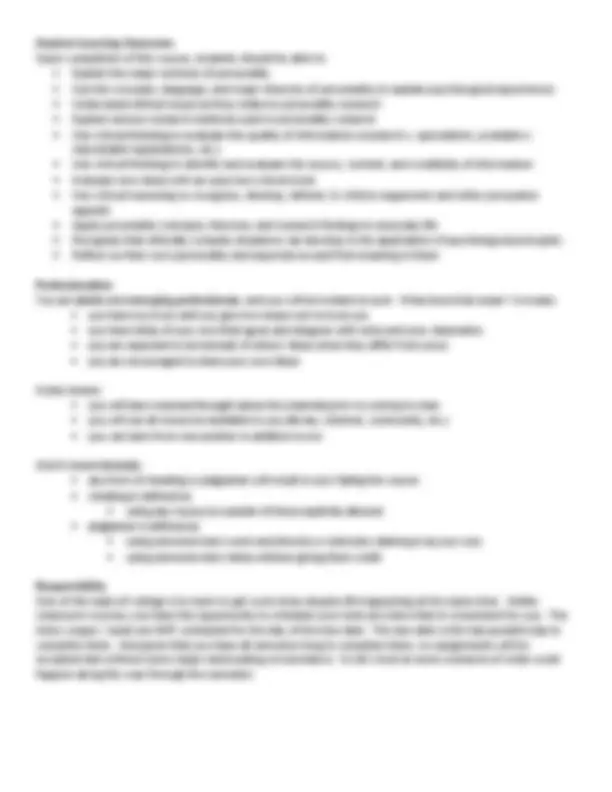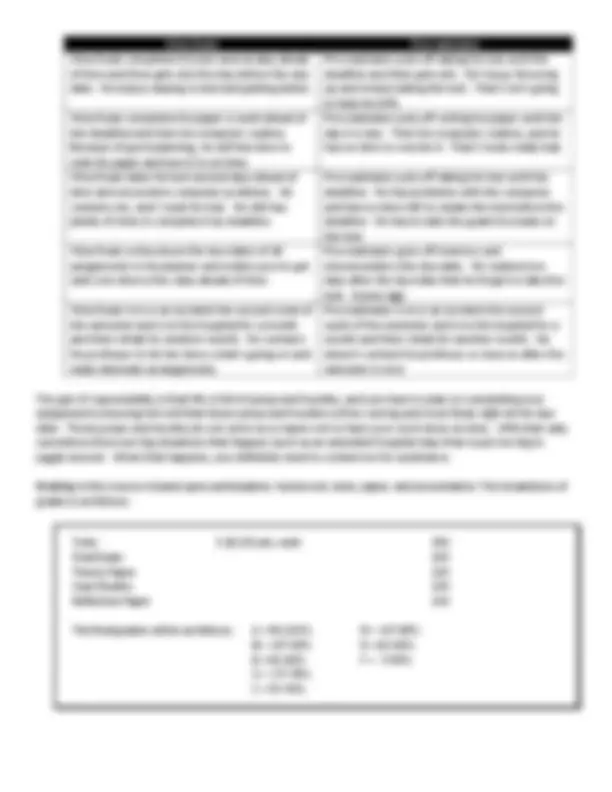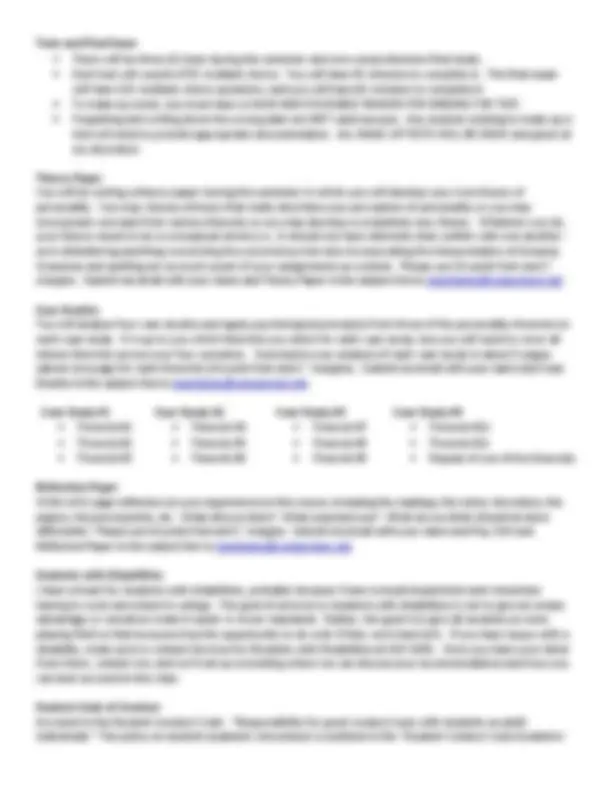





Study with the several resources on Docsity

Earn points by helping other students or get them with a premium plan


Prepare for your exams
Study with the several resources on Docsity

Earn points to download
Earn points by helping other students or get them with a premium plan
Community
Ask the community for help and clear up your study doubts
Discover the best universities in your country according to Docsity users
Free resources
Download our free guides on studying techniques, anxiety management strategies, and thesis advice from Docsity tutors
There will be three (3) tests during the semester and one comprehensive final exam. • Each test will consist of 50 multiple choice. You will have 40 minutes to ...
Typology: Slides
1 / 7

This page cannot be seen from the preview
Don't miss anything!




(pronounced Mc-KAY-me) Kinard 123 (down the hall from the Psychology Office) 323 - 2643 (Office) memckemy@comporium.net Office Hours : Mondays 1:00 – 3: Feel free to just stop by or make an appointment. Psyc 314-001 Theories of Personality (3 credit hours) Advanced integrative study of the most important theories of personality. Prerequisite(s): PSYC 101. Book : Theories of Personality by Susan Cloninger and published by Pearson. Important Rule #1 : Unless I specifically say that I am changing this syllabus, follow what is written. Important Rule #2 : You are responsible for everything said in class - including any and all instances where I change this syllabus - regardless of attendance or absence! Important Rule #3 : Early assignments are always welcomed. Late assignments, however, are not. Ten percent (10%) of the assignment's points will be deducted on all late assignments for each day late (weekends are included). Important Rule #4 : You are free to agree and disagree with me, but make sure that all contact with me is done in a respectful manner. Important Rule #5 : Grammar counts in everything done outside of class. Contacting me – email and the internet have a way of gobbling up messages we send one another. So make sure any time you contact me, especially any time you send me work, that you keep a copy of your email as proof of when you contacted me. That way, if I don’t get your work, you can forward your original email to me to show that your work was indeed in on time. You should always receive a confirmation email from me that I received your work. If you don’t get one, contact me and let me know. The purpose of this course:
Complete the activities Take the practice test (optional but recommended) Take the tests Write the paper Take the exam Campus Resources Students who are enrolled in online courses are entitled to the campus resources made available to on- campus students. These resources include admissions counseling and health services, library, student services, and recreational facilities. Questions regarding access to these resources should be directed to the assigned academic advisor. Qualities to succeed in online courses: Self-motivation o The ability to stay on top of the course without someone watching you. Self-Discipline o It’s nice to be able to work at your own pace, but if you let things slide, either they won’t get done or they’ll get done in a hurried, sloppy manner. Creativity o Just because you're at home taking this courses doesn't mean it has to be boring! Take the time to be creative with the information you are learning. Look something up online to help you learn or remember a concept. Apply the information to your life. Think of ways that will make studying more fun! Cheating o It is very tempting to cheat when you have an exam and haven't studied for it. But at the end of the day, cheating on an assignment or an exam is cheating yourself of the opportunity to learn. Besides, online schooling gives you the opportunity to take the exam when you feel ready, so there is no need to cheat. Take the time to study and give the exam or assignment your best shot. Organization o Making sure you set up a really good study area at home will have a big effect on your overall productivity and efficiency. This means limiting distractions and procrastination tools, turning off the TV, and making the most of the time you have set aside for reading, studying, and homework. Procrastination o If there is one thing almost all students can identify with, it's procrastination. Procrastination is an issue whenever you have important things to do or big responsibilities to meet, and can think of more fun things you'd rather be doing. Identify those things that get you to procrastinate and aim to limit them. Communicate Clearly o Communicating clearly is an essential skill for everyone, regardless of your line of work. Online classes are actually a good way to improve your written communication. Since you are more likely to use electronic communication, you have to learn how to ask questions and enunciate your own point of view clearly and succinctly. Independence o Learning to let go of your professor’s hand can be a good thing. Why? You learn to make decisions on your own and to trust your intuition and own judgment. This is an important skill that will carry over to your job and be a good indicator of the success you will have.
Wise Dude Procrastinator Wise Dude completes his test several days ahead of time and then gets sick the day before the due date. He enjoys staying in bed and getting better. Procrastinator puts off taking his test until the deadline and then gets sick. He’s busy throwing up and misses taking the test. That 0 isn’t going to help his GPA. Wise Dude completes his paper a week ahead of the deadline and then his computer crashes. Because of good planning, he still has time to redo his paper and turn it in on time. Procrastinator puts off writing his paper until the day it is due. Then his computer crashes, and he has no time to rewrite it. That 0 looks really bad. Wise Dude takes his test several days ahead of time and encounters computer problems. He contacts me, and I reset his test. He still has plenty of time to complete it by deadline. Procrastinator puts off taking his test until the deadline. He has problems with the computer and has no time left to retake the test before the deadline. He has to take the grade he made on the test. Wise Dude writes down the due dates of all assignments in his planner and makes sure to get each one done a few days ahead of time. Procrastinator goes off memory and misremembers the due date. He realizes two days after the due date that he forgot to take the test. Goose egg! Wise Dude is in a car accident the second week of the semester and is in the hospital for a month and then rehab for another month. He contacts his professor to let her know what’s going on and make alternate arrangements. Procrastinator is in a car accident the second week of the semester and is in the hospital for a month and then rehab for another month. He doesn’t contact his professor or does so after the semester is over. The gist of responsibility is that life is full of jumps and hurdles, and you have to plan on completing your assignments knowing full well that those jumps and hurdles will be coming and most likely right at the due date. Those jumps and hurdles do not serve as a reason not to have your work done on time. With that said, sometimes there are big situations that happen (such as an extended hospital stay) that is just too big to juggle around. When that happens, you definitely need to contact me for assistance. Grading in this course is based upon participation, homework, tests, paper, and presentation. The breakdown of grades is as follows: Tests 3 @ 100 pts. each 300 Final Exam 200 Theory Paper 100 Case Studies 100 Reflection Paper 100 The final grades will be as follows: A = 90-100% D+ = 67-69% B+ = 87-89% D = 60-66% B = 80-86% F = 0 - 59% C+ = 77-79% C = 70-76%
Tests and Final Exam There will be three ( 3 ) tests during the semester and one comprehensive final exam. Each test will consist of 50 multiple choice. You will have 40 minutes to complete it. The final exam will have 100 multiple choice questions, and you will have 80 minutes to complete it. To make up a test, you must have a VALID AND EXCUSABLE REASON FOR MISSING THE TEST. Forgetting and writing down the wrong date are NOT valid excuses. Any student wishing to make up a test will need to provide appropriate documentation. ALL MAKE UP TESTS WILL BE ESSAY and given at my discretion. Theory Paper You will be writing a theory paper during the semester in which you will develop your own theory of personality. You may choose a theory that really describes your perception of personality or you may incorporate concepts from various theories or you may develop a completely new theory. Whatever you do, your theory needs to be a conceptual whole (i.e., it should not have elements that conflict with one another - as in disbelieving anything concerning the unconscious but also incorporating the interpretation of dreams). Grammar and spelling are as much a part of your assignments as content. Please use 14-point font and 1” margins. Submit via email with your name and Theory Paper in the subject line to memkemy@comporium.net. Case Studies You will analyze four case studies and apply psychological principles from three of the personality theorists to each case study. It is up to you which theorists you select for each case study, but you will need to cover all eleven theorists across your four scenarios. Summarize your analysis of each case study in about 3 pages (about one page for each theorist) (14 point font and 1” margins). Submit via email with your name and Case Studies in the subject line to memkemy@comporium.net. Case Study # Theorist # Theorist # Theorist # Case Study # Theorist # Theorist # Theorist # Case Study # Theorist # Theorist # Theorist # Case Study # Theorist # Theorist # Repeat of one of the theorists Reflection Paper Write a 4 - 6 page reflection on your experiences in this course, including the readings, the notes, the videos, the papers, the powerpoints, etc. What did you learn? What surprised you? What do you think should be done differently? Please use 14-point font and 1” margins. Submit via email with your name and Psyc 314 and Reflection Paper in the subject line to memkemy@comporium.net. Students with Disabilities I have a heart for students with disabilities, probably because I have a visual impairment and remember having to work extra hard in college. The goal of services to students with disabilities is not to give an undue advantage or somehow make it easier or lower standards. Rather, the goal is to give all students an even playing field so that everyone has the opportunity to do well, if they work hard at it. If you have issues with a disability, make sure to contact Services for Students with Disabilities at 323-3290. Once you have your letter from there, contact me, and we’ll set up a meeting where we can discuss your accommodations and how you can best succeed in this class. Student Code of Conduct As noted in the Student Conduct Code: “Responsibility for good conduct rests with students as adult individuals.” The policy on student academic misconduct is outlined in the “Student Conduct Code Academic
Schedule The following schedule shows the deadlines for work to be completed. You are always free to work ahead and even complete the course early. Since many courses are taught in 5 week sessions, it’s certainly possible to complete the course in half the time allotted. Introduction to Personality Theory Freud: Classic Psychoanalysis Jung: Analytical Psychology Adler: Individual Personality Test 1 due by 5:00 p.m. eastern time, Friday September 16 Horney: Interpersonal Psychoanalysis Erikson: Psychosocial Theory Cattell Bandura: Social Learning Theory Test 2 due by 5:00 p.m. eastern time, Friday October 7 Kelly: Personal Construct Theory Rogers Maslow: Hierarchy of Needs Buddhism Test 3 due by 5:00 p.m. eastern time, Friday November 4 Case Study Paper due by 5:00 p.m. eastern time, Friday, November 18 Theory Paper due by 5:00 p.m. eastern time, Friday, December 2 Final Exam due by 5:00 p.m. eastern time, Friday December 9 Reflection Paper due by midnight eastern time, Friday, December 9